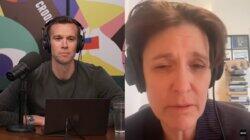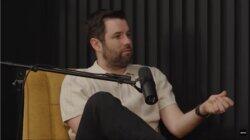Offline with Jon Favreau - Season 3 / Year 2024

Season 3 / Year 2024

Episodes

Dry January, Cali Sober, Soft Sober: Why Gen Z is Breaking Up With Booze
Maybe, your friend announced they're not drinking anymore, or your sister's now "California Sober," or maybe your entire office is participating in Dry January. It's not just you, going sober is the hot new thing, with 41% of Americans aged 18 to 35 saying they don't drink at all. Today, we explore the changes in drinking culture, in how we think about wellness and health, in how we socialize and spend our free time, and yes, changes in technology, that are converging to make America sober. Max interviews Crooked producers about their relationship with alcohol and then talks to Dr. Edward Slingerland, an expert on humanity's relationship with alcohol, about why humans drink and what changed about alcohol and our world to make more people choose sobriety.

The Science of Achieving (and Enjoying) Your New Year's Resolution
When it comes to sticking to a New Year's resolution, willpower alone won't cut it.

Were Trump's Opponents Too Online? Plus, R. F. Kuang on Her Twitter Era Novel
RF Kuang joins Jon to talk about Yellowface, her biting satire about the internet, publishing industry, and cultural appropriation.

Are Algorithms Making You Boring?
Kyle Chayka, New Yorker staff writer and author of "Filterworld: How Algorithms Flattened Culture," joins Offline to expose how online feeds push us into the mainstream and away from each other.

What's Really Behind the Media Apocalypse?
Peter Hamby, host of Snapchat's Good Luck America and a founding partner at Puck News, returns to Offline to discuss whether journalism is headed towards extinction. With the latest round of media layoffs hollowing out the industry more than ever before, how will people stay informed—and do they even want to? Has the news lost its primacy in the American mind? But first! Max and Jon break down Zuckerberg & co.‘s testimony before the Senate Judiciary Committee, why children's online safety is the social media moguls' achilles heel, and whether Universal Music pulling their catalogue from TikTok is actually a big deal.

Authoritarians or A-holes? Kara Swisher on Tech's Biggest Egos
Kara Swisher, longtime tech reporter and author of the forthcoming memoir Burn Book, joins Offline to talk about the tech tycoons who think they're qualified to run our country. She and Jon break down Silicon Valley's ever growing self importance, whether its leaders are more or less fascist than we think, and how big tech ate the media industry alive. But first! Max and Jon explain why Apple's Vision Pro headset is the company's most impressive—and depressing—gadget to date, and how Taylor Swift and Travis Kelce are saving American monoculture.

The Neuroscience of Why We're Susceptible to Lies, Outrage, ad Fascism
Cass Sunstein, Harvard professor and coauthor of the forthcoming book, Look Again, joins Offline to discuss the dangers of habituation. When things become so commonplace that they blend into the background of our everyday lives, we stop appreciating the good and identifying the bad. Jon and Cass examine how authoritarian regimes are normalized, whether you can pay people to quit their social media addictions, and why repeating lies makes them more believable. But first! Max and Jon dive into Meta's decision to stop recommending political content on their platforms, President Biden's foray onto TikTok, and what a recent Selena Gomez deepfake means for the future of scamming.

An Ex-Tucker Carlson Employee Tells All
Tina Nguyen, national correspondent at Puck News, joins Offline to talk about her new memoir, "The MAGA Diaries." The book sheds light on the conservative movement's college recruitment pipeline, and how it's propelled a new generation of alt-right leaders to the upper echelons of American politics, courts, and social movements. Tina chronicles how this shadowy network helped her start out in the world of right-wing journalism, what compelled her to eventually defect to the mainstream, and all the MAGA mad caps she met along the way.
But first! Jon and Max take a look at Sora, the new AI model that can turn text into video, Jon Stewart, who's back to hosting the Daily Show after 9 years away from the desk, and Favs himself — when will Jon learn to stay out of Twitter fights?

Woke AI, Libs of TikTok DESTROYED, and the Offline Reality of Long COVID
Zeynep Tufekci, sociologist and New York Times opinion columnist, joins Offline to discuss why long covid has unleashed so much online vitriol, united the Senate, and exposed just how little Americans trust institutions. Jon also sits down with his producer, Emma, to talk about her firsthand experience with the disease, and how she navigates an information environment rife with suffering and confusion—but also solidarity and hope.
But first! Jon and Max weigh in on Google's new "woke" AI, which has been cooking up images of Asian founding fathers, Black Vikings, and, unfortunately, racially diverse Nazis. Then, they break down Taylor Lorenz's interview with the infamous founder of Libs of TikTok, and how the long-form, short-form, and print coverage of the conversation each land differently online.

TikTok Ban Returns, AOC Hounded by Protesters, and Jon Ronson on the End of Public Shaming
Jon Ronson, author of So You've Been Publicly Shamed and host of the BBC podcast "Things Fell Apart," joins Offline to discuss culture wars—why do they originate in America? Are they going too far? Are we all becoming immune to the public-shaming superbug? But first! Max and Jon break down the latest bombardment of everyone's favorite algorithm (TikTok ban) and everyone's favorite politician (AOC being screamed at).

Kate Middleton MIA, UFOs, and How Conspiracies Got Fun
Kate Middleton sightings have dipped below UFO sightings, and the internet is having a heyday! It's conspiracy theory week at Offline, with Max and Jon offering up their own takes on the missing Princess of Wales. Then, they break down the latest developments of the House's proposed TikTok ban––including content creators' ludicrous theories behind what's really going on. To cap it off, Max sits down with Vox Senior Correspondent, Dylan Matthews, to talk through a new UFO report from the Pentagon. They tell the story of how UFOs were mainstreamed by an otherworldly alliance between the drummer of Blink-182, a former Senate Majority Leader, and the New York Times.

Is Trump Benefiting from Our 2020 Amnesia?
Eric Klinenberg, sociologist at New York University, joins Offline to discuss why our failure to process 2020 may lead to another disastrous Trump term. His newest book, 2020, breaks down the year that reshaped our politics, unveiled cracks in our society, and transformed the ways we live, work, and interact with each other. Eric and Jon unpack how Trump's Covid-era leadership politicized public health and left Americans to fend for themselves. They discuss how to best address widespread resentment and institutional distrust, and consider how to grapple with the lasting effects of a year we'd rather forget.

How to Be Happy with Dr. Laurie Santos
Dr. Laurie Santos, Yale University's "Happiness Professor," joins Offline to lay out a scientific guide to finding happiness. On her podcast The Happiness Lab and in her course Psychology and the Good Life (the most popular in Yale's 300 year history), Laurie educates people on the way our brains lie about what makes us happy and helps them reorient their priorities to find genuine happiness. She sits down with Jon to talk about the root causes of declining happiness among young people, why in-person interaction is a crucial part of being human, and why putting others before ourselves makes us happier than fulfilling what we think we want. But first! Jon and Max are surprised to learn they agree with Ron DeSantis and break down the ridiculous conspiracy theories that have taken over Twitter after the collapse of the Francis Scott Key bridge in Baltimore.

Are You Treating Politics Like a Hobby?
Are college educated Democrats going to cost Joe Biden the election? Eitan Hersh, a Political Science professor at Tufts, joins Offline to take a closer look at "political hobbyists," aka people who think that getting involved in politics means following the news and forming political opinions. Eitan's book, Politics is for Power, lays out a roadmap for folks who are tired of online takes and ready to get involved in politics at the community level—where engagement could make a real impact. He and Jon talk about what organizing looks like in every day life, and how the most important activism is the kind you probably won't find on social media.

Trump's Stock Crash, AI Gets Junkier, and Paying to Delete Social Media
Is FOMO the only thing keeping you on social media? Have we already reached peak artificial intelligence? And are Max and Jon too old to enjoy Glorb, a Spongebob Squarepants AI that's become the hottest rapper on the internet? The guys cheer on the nosedive of Trump's media company stocks, break down the latest research in why your friends want you to quit social media, and answer mailbag questions like "will Jon ever stop getting in Twitter fights?"

Right Wing Media Collapse, Trump Trial's Repost King, and How To Live Like You're Not Dying
We did it folks! Jurors for Trump's hush money trial are getting to read their resistance tweets to his face as Meta's crackdown on news is slowly asphyxiating conservative media. Jon and Max celebrate the good news, and then dive into the much more somber topic of dating in the Internet Age. It turns out Gen Z is abandoning dating apps in favor of social media and the "old school" approach of meeting people in person. Then, Max interviews blogger Jenny Livingston about what it's like to learn you're going to live 50 more years, thanks to a new drug that's working miracles for her and many other people with cystic fibrosis.

The Biden Campaign's Plan to Beat Trump Online
Can Biden outpost Trump in the run up to 2024? Why is the president on TikTok if he wants to ban it? Rob Flaherty, former White House Director of Digital Strategy and current Deputy Campaign Manager for Biden joins Offline to explain. Jon and Rob talk about the ways the media environment has changed since 2020, how the Biden campaign is cutting through the noise this time around, and the importance of acknowledging voters' frustrations.

How Cognitive Bias Explains Taylor Swift, Donald Trump, and Internet Malaise
We all have a caveman brain—at least when it comes to navigating the internet. Amanda Montell, author of the new book The Age of Magical Overthinking, joins Offline to explain how the "cognitive biases" that we developed to make snap decisions in prehistoric times aren't well suited to handle the volume and pace of the information era. She and Jon talk about biases like the halo effect, zero-sum biases, and declinism, and identify how these biases have supercharged celebrity fandom, influenced our news media, and made Democrats nostalgic for the George W. Bush era.

TikTok vs Biden, Kendrick vs Drake, AI vs Loneliness
Is it time for you to make an AI friend? Jon and Max weigh the pros and cons of robot affirmation, sink their teeth into a new study on smart phone bans in schools, and then turn their attention to something they're both very qualified to talk about: the rap beef between Kendrick Lamar and Drake that's reanimating Twitter. Plus, a new East vs. West feud takes shape as the guys face off for Vote Save America's "Organize…or else" campaign. Head to votesaveamerica.com/2024 to ally yourself with your favorite Offline host.

AI's Flirty Upgrade, Facebook's Zombie Internet, and Why We May Be Doing Mental Health Wrong
ChatGPT has officially entered its "Her" era! Jon and Max talk about the flirty AI that debuted this week, whose husky voice and warm enthusiasm evokes Scarlett Johansson. But not all the tech titans are doing so hot; Facebook's noxious combo of AI-generated content and the real people who are falling for it has been coined the "zombie internet." The guys discuss Meta's spam problem, then take a look at how mental health curricula in schools can actually make things worse for students

ScarJo v. AI, the Digital Guillotine, and Why We Play Make Believe with Misinformation
Do we treat political affiliation like a religion? Which parts of our identity are based off factual belief vs. imaginary belief? This week, Max talks to Professor Neil Van Leeuwen about the difference between thinking and believing, the power of groupish thought, and the similarities between religious creeds and political ideologies. But first! Jon and Max break down the drama between Scarlet Johansson and OpenAI, pick apart the TikTok blockout, and suspend their disbelief that a close friend of the pod is…on Survivor?! Will he love it or leave it?

Trump's TikTok Edge and Why Birds May or May Not Be Real
Birds Aren't Real founder, Peter McIndoe, joins to talk about the impact of the satirical conspiracy that captured the imagination of Gen Z and what he learned about the appeal of false realities after spending years in character as one of the nation's leading conspiracy theorists.

How the Right Won the Internet and How the Left is Fighting Back
Why are Republicans apologists for misinformation? How should campaigns respond to online trolls? Are Democrats still using an Obama-era digital strategy? Journalist Sasha Issenberg joins Offline to talk about his new book, The Lie Detectives, and to break down how to defeat conservatives in a truth-agnostic world. He and Jon discuss how today's political class is adapting to a tumultuous and Trumpy social media landscape, and why controlling today's narrative is more elusive than ever before.

Have Smartphones Created an Anxious Generation? with Jonathan Haidt
The kids are not alright, and the culprit is their phones. That's the thesis of social psychologist Jonathan Haidt's new book, The Anxious Generation. He joins Offline to discuss why he thinks smartphones and social media are fueling a teen and adolescent mental health epidemic, the evidence behind his claims, and the criticism his anti-phone crusade has received. Then he and Jon dive into the four recommendations Haidt believes will lead us out of this crisis.

Social Media Warning Labels, LA Kids Go Offline, and the Rise of Slop AI
Has this pod saved America…from phone addiction?! We got Jon Lovett to take a rather extreme version of the Offline challenge in Fiji, AND America's top doctor and friend of the pod Vivek Murthy is now calling for a Surgeon General's warning label on social media platforms. Max and Jon bask in their success, then mourn the dismantling of the Stanford Internet Observatory, the nation's leading mis- and disinformation research organization. Then, Max sits down with longtime tech journalist Brian Merchant to talk about whether AI development is slowing down, why workers should organize against the technology, and what good AI use cases and centaurs have in common.

Why The Music Industry Is Embracing AI
Chat GPT isn't going to top the Billboard Hot 100 any time soon, but something is happening with AI and music—something's BEEN happening. Unlike in entertainment and journalism, big music labels and even musicians like Drake and Grimes are cautiously embracing the latest in AI. And the results are not all bad! New Yorker writer John Seabrook sits down with Max to explain why the music industry has historically adopted new technologies, and how that Muddies the Waters around what is made by humans vs. what is made by machines. What does the future of songwriting look like with an AI Bob Dylan? Will a tide of lowbrow AI slop hurt artist payouts? And what's really behind the record industry standing with artists?

The Biden Reckoning Will Be Tweeted; plus, Interviewing Nazis with Elle Reeve
Elle Reeve, CNN commentator and author of the new book Black Pill, joins Offline to share her reporting on the darkest corners of the internet. For over a decade, Reeve has tracked the emergence of the alt-right, watched them radicalize on sites like 4chan and 8chan, and documented their migration off the web and into the streets of Charlottesville and halls of the Capitol. She and Jon talk about how this new brand of white nationalism feeds on male loneliness and white resentment, the schisms within the movement, and its implications for politics. But first! Jon and Max unpack the last few weeks of Dem Drama®. The guys critique the debate discourse, explain why social media forced this conversation to happen, and reveal why Jon is finally disabling some of his Twitter notifications.

Why Kamala Fandom is Rocking the Internet – and the Trump Assassination Isn't
We still don't know why a 20-year-old from Pennsylvania opened fire on Trump last weekend. Lone shooters whose paths from normalcy to vigilantism seem esoteric, obscure, or perverse have become a familiar pattern—but there's actually a lot we do understand about the origins of political violence. Max sits down with terrorism scholar J.M. Berger to understand the psychology of violent extremists and what role the internet plays in their decision to act. But first! Max is joined by the New Yorker's Jessica Winter to talk about the online fandom around Vice President Kamala Harris and the true meaning of the coconut emoji.

Kamala Harris' Coconut-Pilled Brat Girl Summer
Kamala Harris memes are bringing together leftists and wine moms, neolib shills and NeverTrumpers, political wonks and pop stars across every platform. Why is the presumptive Democratic nominee for president breaking the internet and right-wing brains? Jon and Max discuss the danger of the VP leaning into the memes, MAGA trolls' reaction to her candidacy, and how much of Silicon Valley is all in on Trump.

JD Vance, Project 2025, and How the Right Got Weird
All of a sudden, nearly every Democrat in the country has started calling out Republicans for being really damn weird. And with JD Vance's pronatalist views and Trump's insistence that Kamala Harris isn't actually Black, the GOP isn't beating the allegations. When did Republican rhetoric go from fear-inducing, to groan-inducing? Jon is joined by Laura K. Field, a researcher and political theorist who recently published a piece in POLITICO on the topic, and who is writing a book about the evolution of the Republican party. She breaks down why GOP weirdness is tied to the emergence of the "New Right," how JD Vance exemplifies this moment, and how to prevent the movement from capturing more power in American politics.

How Tim Walz's Big Dad Energy Went Viral
Why is Tim Walz, a 60-year-old dad from Minnesota, so internet savvy? And why is he so good at making right wingers look not just weird, but also extremely, chronically and dangerously online? Jon and Max discuss the meme appeal of Harris' new VP pick, why Republicans are sinking deeper into weirdness with transphobic attacks on Olympians, and what X's latest legal tantrum is really about.

Trump and Elon's Trainwreck Interview & J.D. Vance's Real Tech Agenda
Elon Musk hosted Donald Trump for a two and a half hour ramble on Twitter's garbage live streaming platform—and if you think SpaceX flubs launches…well, they've got nothing on X Spaces. Max sits down with Hysteria's Erin Ryan to recap the most head-smacking parts of the conversation, and ask the question of our generation: if Elon doesn't call it X, why should we? After that, Katie Paul, director of the Tech Transparency Project, joins the show to talk about J.D. Vance's ties to a small but powerful faction of tech elites in Silicon Valley. Vance's personal investments in Rumble, the favored social media of racist militias, expose his true tech agenda of enriching his friends and himself at the expense of the rest of us.

How Peter Thiel Became the Right's Tech-Authoritarian Kingmaker
Peter Thiel isn't as rich as Elon Musk or as notorious as Steve Bannon. But over the last 10 years he has grown from Silicon Valley's oddball conservative to an ideological anchor of the Trump era. And, unfortunately for us, he thinks the country would be better off without voting. Bloomberg Businessweek reporter, Max Chafkin, has written a book about Thiel and his mind boggling worldview: The Contrarian. He joins Max to discuss what Thiel wants from the Republican Party, his mentorship of J.D. Vance, and how he's emboldening a huge swath of tech leaders to be openly MAGA.

Obama's Offline Speech, Zuck Fears Trump, and the Crank Political Divide
Max and Jon sit down to break down a very online DNC, diving into Obama's anti-social media convention speech, the MyPillow guy's embarrassing troll attempts, and a Taylor Swift & Beyonce rumor that spun out of control. Plus: Mark Zuckerberg's fear driven turn towards Trump and the new political divide: cranks vs. everyone else.

Trump Tours the Manosphere, Russia Funds MAGA Influencers, and Hawk Tuah Girl Cashes In
It's not just supplements and energy drinks fueling the manosphere. Your favorite right-wing podcaster may be sponsored by…Vladimir Putin! Jon and Max discuss the new federal indictment alleging that the Kremlin has been funding right-wing internet personalities, including Tim Pool. Then they break down why the Brazilian Supreme Court has blocked access to X and why the "Hawk Tuah" girl's new podcast showcases the difference between virality and popularity. But first! Donald Trump is doing the red-pilled podcast circuit in an effort to get young men to vote for him. The guys take stock of the former president's appearances from Jake Paul to Lex Fridman, and explain why a "laid-back" Trump is so dangerous.
Recently Updated Shows

Celebrity IOU
Celebrity IOU is a series where Hollywood A-listers express their deep gratitude to the individuals who have had a major impact on their lives by surprising them with big, heartwarming home renovations that bring everyone to tears.

The Gilded Age
The American Gilded Age was a period of immense economic change, of huge fortunes made and lost, and the rise of disparity between old money and new.
Against this backdrop of change, the story begins in 1882 — introducing young Marian Brook, the orphaned daughter of a Union general, who moves into the New York City home of her thoroughly old money aunts Agnes van Rhijn and Ada Brook. Accompanied by Peggy Scott, an accomplished African-American woman, Marian inadvertently becomes enmeshed in a social war between one of her aunts, a scion of the old money set, and her stupendously rich neighbors, a ruthless railroad tycoon and his ambitious wife, George and Bertha Russell.
In this exciting new world that is on the brink of the modern age, will Marian follow the established rules of society, or forge her own path?

The Curse of Oak Island
The Curse of Oak Island documents brothers Rick and Marty Lagina as they pursue their lifelong dream of solving more than a 220-year old Oak Island mystery. For over two centuries, teams of searchers, including Franklin D. Roosevelt, have attempted to crack the code that will unearth the treasure believed to be buried on the small island off the coast of Nova Scotia. Armed with the knowledge of those that came before them, the muscle of heavy machinery and decades of engineering know-how, the Lagina's and their partners may be closer than anyone in history to finding the treasure that has so far claimed the lives of six men.

Wild Cards
Wild Cards follows the unlikely duo of a gruff, sardonic cop and a spirited, clever con woman. Ellis, a demoted detective, has unfortunately spent the last year on the maritime unit, while Max has been living a transient life elaborately scamming everyone she meets. But when Max gets arrested and ends up helping Ellis solve a local crime, the two are offered the opportunity to redeem themselves, with Ellis going back to detective and Max staying out of jail. The catch? They have to work together, with each using their unique skills to solve crimes. For Ellis, that means hard-boiled shoe leather police work; for Max, it means accents, schemes and generally befriending everyone in sight, while driving Ellis absolutely nuts. Against the backdrop of beautiful Vancouver — with all its unique, charming, and even contradictory neighbourhoods and subcultures — the two will have to learn what it means to trust another person and maybe actually become partners.

Maine Cabin Masters
In Maine Cabin Masters, builder Chase Morrill is teaming up with his sister, brother-in-law and best friend to save and transform abandoned cabins buried deep in the remote woods of Maine. From historic cottages nearly a century old, to camp cabins in need of some major TLC, they'll give these properties the facelift they've needed for decades. And, you never know what you might find when you go for a walk in the woods.